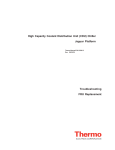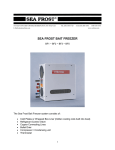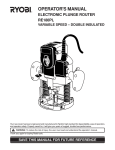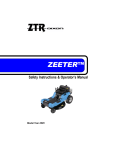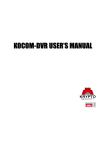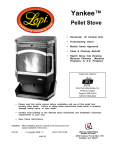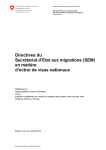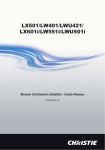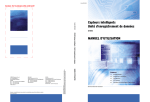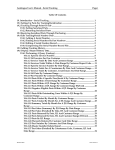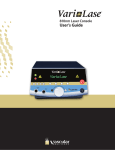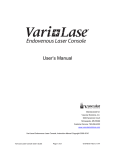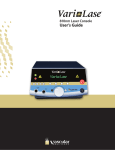Download Troubleshooting FRU Replacement Coolant Distribution Unit (CDU
Transcript
Coolant Distribution Unit (CDU, Chiller) Jaguar Platform Thermo Manual P/N U00862 Rev. 03/08/06 Troubleshooting FRU Replacement Table of Contents Preface After-sale Support ..................................................................................... 3 Warranty .................................................................................................. 3 Section I Safety Warnings .................................................................................................. 5 EMO Circuit .............................................................................................. 6 Lockout/Tagout (LOTO) ............................................................................. 6 Section II Troubleshooting Error Code Troubleshooting ....................................................................... 7 VFD Faults ............................................................................................. 20 Monitoring Fluid Loss ............................................................................. 22 Section III FRU List FRU List ................................................................................................. 23 Section IV FRU Replacement Electrical Components ........................................................................... 40 Control Box Assembly ............................................................................ 42 Keypad ................................................................................................... 43 Dryer Tube .............................................................................................. 44 Fill Port Screen ...................................................................................... 45 HFE Filter Bag Kit .................................................................................. 46 Pump Inline Dryer ................................................................................... 51 Tank Level Switch ................................................................................... 52 Pump ..................................................................................................... 53 Temperature Control Valve Assembly ...................................................... 57 Temperature Control Valve Actuator ........................................................ 62 Water Flow Transducer ........................................................................... 63 HFE Side Temperature Sensor (rtd1) ...................................................... 64 Pressure Transducers ........................................................................... 65 Drip Pan Level Switch Kit ....................................................................... 66 Pressure Regulator ................................................................................. 67 Plumbing, Pressure Regulator to Temperature Control Valve .................. 69 Plumbing, Facility Inlet Pipe ................................................................... 70 H2O Side Temperature Sensor (rtd2) ...................................................... 71 Return Pipe Assembly, Process Flow ..................................................... 72 Supply Pipe Assembly, Process Flow .................................................... 74 PRV Cartridge ........................................................................................ 76 VFD Filter, Contactor, Transformer .......................................................... 77 EMO Thermostat .................................................................................... 78 VFD ........................................................................................................ 79 VFD Settings .......................................................................................... 80 Circuit Breaker ........................................................................................ 81 Temp Option Board ................................................................................. 82 Chip Replacement .................................................................................. 83 TC-400 Controller .................................................................................... 84 -1- LON Adapter Board ................................................................................. 86 Sight Tube Kit ......................................................................................... 87 Torque Specification Sheet ...................................................................... 89 Swagelok Tube Fitting Instructions ......................................................... 90 Section V Controller Loops Main Loop .............................................................................................. 93 Engineering Loop .................................................................................... 94 Factory Reset ......................................................................................... 95 Section VI Facility Drawings 873-592-22 ............................................................................................. 96 873-611-00 .............................................................................................. 99 WARRANTY -2- Preface After-sale Support Thermo Electron Corporation is committed to customer service both during and after the sale. If you have questions concerning the CDU operation, contact our Sales Department. If your CDU fails to operate properly, or if you have questions concerning spare parts contact our Service Department. (800) 258-0830 (603) 436-9444 Fax: (603) 436-8411 Before calling, please obtain the following information: - CDU BOM number - CDU serial number - CDU software version - voltage of power source The CDU’s BOM and serial number label are located on the label on the fronttop of the CDU. See Service Manual for instructions on how to display the software version. Warranty CDUs have a warranty against defective parts and workmanship for 24 months from date of shipment. See back pages for more details. -3- This page intentionally left blank. -4- Section I Safety Warnings Make sure you read and understand all instructions and safety precautions listed in this manual before installing or operating your CDU. If you have any questions concerning the operation of your CDU or the information in this manual, contact our Sales Department for assistance. DANGER DANGER indicates an imminently hazardous situation which, if not avoided, will result in serious injury or death. This signal word is limited to the most extreme situations. WARNING WARNING indicates a potentially hazardous situation which, if not avoided, could result in serious injury or death. CAUTION CAUTION indicates a potentially hazardous situation which, if not avoided, may result in minor or moderate injury. It may also be used to alert against unsafe practices. Performance of installation, operation, or maintenance procedures other than those described in this manual may result in a hazardous situation and may void the manufacturer’s warranty. Transport the CDU with care. Sudden jolts or drops can damage the CDU. Do not attempt to defeat any of the interlock switches or safety features built into the CDU. Observe, and never remove, all warning labels. Never operate damaged or leaking equipment. Never operate the CDU without cooling fluid in the fluid reservoir. Process fluid are subject to environmental regulatory restrictions. Do not dispose into the environment. In the United States use proper OSHA approved location for disposal. Use remote lockout tag-out procedures prior to servicing the CDU. Make sure the CDU is off before connecting or disconnecting the power cord or other cables. Always turn off the CDU and disconnect the power cord from the power source before performing any service or maintenance procedures, or before moving the CDU. Always empty the fluid reservoir before moving the CDU. Never operate equipment with damaged power cords. Refer service and repairs to a qualified technician. -5- EMO Circuit Each of the following safeties is part of the test system Emergency Off (EMO) circuit. The tripping of either of these safeties will cause power to be dropped to the CDU by the test system. The EMO circuit should not exceed 10A @ 24VDC. High Air Temperature (TSH-101) This safety opens the EMO circuit when the air temperature safety switch detects a temperature inside the CDU greater than 70°C. The temperature switch is self-resetting at a temperature of 54°C or below. Lockout/Tagout (LOTO) Before performing Chiller maintenance, the energy sources associated with the Chiller system must be lockout and tagged out (LOTO). Since the CDU itself has no electrical LOTO, lock out power remotely. Electrical LOTO can be provided by: Disconnecting main power at the facility power source prior to the system controller cabinet. The unit does not provide LOTO for the facility water flow. An external usersupplied device is required. In addition, follow all local facility LOTO directives. -6- Section II Troubleshooting Error Code Troubleshooting LEVEL WARN LED Error Message Cause: Upper low level warning switch closed for at least 3 seconds. Fluid Level OK? NO Also see Monitoring Fluid Loss on page 22. Add fluid YES NO NO Is switch/wiring defective? Did message clear? YES YES Replace switch/wiring. See page 52 50. NO Did message clear? YES Reset controller. See page 95 87. Did message clear? Return to normal operation YES NO Replace controller. See page 79. -7- Recalibrate controller. Refer to Teradyne Service Documentation FILTER LED Error Message Cause: Return pressure greater than 10 psi for 1 minute. NOTE: Normally indicates the filter in the reservoir needs changing. Remove filter. See page 44. Does filter need changing? YES Change filter. See page 44. 46 NO NO Reset controller. See page 95 87. Did error message clear? YES Return to normal operation Did message clear? NO YES Recalibrate controller. Refer to Teradyne Service Documentation Replace controller. See page 84 79. -8- LOW HFE PRES LED Error Message Cause: A major leak has developed or the unit supply pressure less than 20 psi for 30 seconds after pump / VFD start. Is there any evidence of a leak? YES Repair the source of the leak(s) NO Is VFD displaying an error message? NO YES NO YES Are pressure transducers functional? YES Return to normal operation Troubleshoot VFD. See page 20 22. NO Is pump running? Did error message clear? Did error message clear? YES Replace transducers. 65 See page 61. NO YES NO NO Is VFD Volt IN correct? NO YES Is VFD Volt OUT correct? Did error message clear? YES Return to normal operation Correct Volt IN. NO Continued on next page -9- Did error message clear? YES Continued from previous page Is VFD Volt OUT correct? Correct V OUT. Refer to Teradyne Service Documentation NO YES NO Is wiring between VFD and pump correct? NO Did error message clear? YES Did error message clear? YES Replace wiring NO YES Replace pump. See page 53 51. Reset controller. See page 95 87. Did message clear? Return to normal operation YES NO Replace controller. See page 84 79. - 10 - Recalibrate controller. Refer to Teradyne Service Documentation LVL FAULT LED Error Message Cause: Lower low level warning switch open for at least 3 seconds NOTE: The LEVEL WARN LED should also be on, if not replace the level switch assembly Fluid Level OK? NO Also see Monitoring Fluid Loss on page 22. Add fluid YES NO NO Is switch/wiring defective? Did message clear? YES YES Replace switch/wiring. See page 52 50. NO Did message clear? YES Reset controller. See page 95 87. Did message clear? NO Return to normal operation YES Recalibrate controller. Refer to Teradyne Service Documentation Replace controller. See page 79. 84 - 11 - TEMP FAULT LED Error Message Cause: Fluid temperature higher than alarm setpoint value in controller's setup loop. NOTE: This is normally not a pump issue Is facility water adequate? NO Adjust facility water temperature/flow/pressure YES Did message clear? NO Is control valve plunger full down? See page 62 58. YES NO Is voltage at valve ~9½VDC? Refer to Teradyne Service Documentation. NO YES Adjust voltage. YES NO Replace valve and adjust. voltage. Did message clear? YES NO Is pressure across valve correct? NO Adjust pressure. See page 68 64. YES NO Reset controller. See page 95 87. Did message clear? YES Return to normal operation Did message clear? NO YES Recalibrate controller. Refer to Teradyne Service Documentation Replace controller. See page 84 79. - 12 - TEMP FAULT LED Error Message Cause: Fluid temperature lower than alarm setpoint value in controller's setup loop. NOTE: This is normally not a pump issue. Is control valve plunger full up? See page 62 58 NO YES Is voltage NO Adjust voltage. at valve ~0VDC? Refer to Teradyne Service YES Documentation. NO Replace valve/ adjust voltage. Did message clear? YES Reset controller. See page 95 87. Did message clear? NO Return to normal operation YES Recalibrate controller. Refer to Teradyne Service Documentation Replace controller. See page 84 79. - 13 - DRIP PAN LED Error Message Cause: Drip pan level switch is open. Is there fluid in the drip pan? YES Remove fluid Check for leaks NO NO NO Is switch/wiring defective? Did message clear? YES YES Replace switchs/wiring. 66 See page 62. NO Did message clear? YES Reset controller. 95 See page 87. Return to normal operation YES Did message clear? NO Replace controller. See page 84 79. - 14 - Recalibrate controller. Refer to Teradyne Service Documentation VFD FAULT LED Error Message Cause: Open relay on VFD. Does VFD display an error? YES Troubleshoot VFD. 20 See page 32. NO NO NO Is wiring defective? Did message clear? YES YES Fix wiring NO Did message clear? YES Return to normal operation Reset controller. 95 See page 87. Did message clear? NO YES Recalibrate controller. Refer to Teradyne Service Documentation Replace controller. 84 See page 79. - 15 - These error messages require checking the applicable sensor and its associated wiring. If the error message does not clear reset and/or replace the controller. SENSOR FAIL LED Error Message The reservoir fluid temperature probe RTD1 input is open or shorted, 84 see page 60. Error Message The coolant return pressure sensor input is out of range, see page 63. 67 Error Message 67 The coolant supply pressure sensor input is out of range, see page 63. Error Message The supply pressure is greater than 110 psi. Error Message The differential pressure equals a negative value for at least 3 seconds. - 16 - COMM DISC LED Error Message Cause: Communications lost for over 10 seconds while operating in the remote mode. Are all connections secure? NO Secure connections YES NO Are commands being sent to the unit? NO NO Reset controller. See page 87. 95 NO YES Send start command. YES Did message clear? Did message clear? Did message clear? YES Return to normal operation YES Recalibrate controller. Refer to Teradyne Service Documentation Replace controller. See page 84 79. - 17 - These error messages require controller chip replacement, 83 see page 78. Error Message Error Message Error Message Error Message This error message requires replacing the control board 83 and 79. 84 or controller's chip, see pages 78 Error Message These error messages require checking user software/hardware. Error Message Error Message Error Message - 18 - Unit will not start, no error message displayed. Is 1CB closed? NO Close 1CB YES NO Is incoming voltage and/or phase to 1T correct ? NO NO NO YES Adjust voltage and/or phase YES Is 1T secondary voltage correct? Did display come on? Did display come on? YES Replace 1T. See page 77 72. NO YES Reset controller. See page 95 87. Did display come on? YES Return to normal operation Did message clear? NO YES Recalibrate controller. Refer to Teradyne Service Documentation Replace controller. See page 84 79. - 19 - - 20 - Under Voltage Over Voltage Motor Stalled Motor Overload Heatsink OverTemp Ground Fault F005 F006 F007 F008 F013 Power Loss F003 F004 Fault Display 2 1 1 1 1 1 2 Type For any other fault display contact Thermo. A current path to earth ground has been detected at one or more of the drive output terminals. Heatsink temperature exceeds a predefined value. Internal electronic overload trip. Drive is unable to accelerate motor. DC bus voltage exceeded maximum value. DC bus voltage fell below the minimum value. DC bus voltage remained below 85% of nominal. Description Check the motor and external wiring to the drive output terminals for a grounded condition. 1. Check for blocked or dirty heat sink VFD fins. Verify ambient temperature has not exceeded 50°C(122°F) 2. Check fan. An excessive motor load exists. Contact Thermo. Check connections on VFD. Monitor the AC line for high line voltage or transient conditions. Bus overvoltage can also be caused by motor regeneration. Extend the decel time or install dynamic brake option. Monitor the incoming AC line for low voltage or line power interruption. 1. Monitor the incoming AC line for low voltage or line power interruption. 2. Check input fuses. Action Type 2- This type of fault may require VFD or motor repair, or is caused by wiring or programing errors. The cause of the fault must be corrected before the fault can be cleared. Type 1 - The VFD attempts to automatically reset the fault. If the condition that caused the fault is no longer present, the fault will be reset and the VFD will be restarted. A fault is a condition that stops the VFD. There are two fault types: VFD Faults - 21 - Phase UW Short Phase VW Short F042 F043 I/O Board Fail Phase UV Short F041 F122 Phase W to Ground F040 Power CDU Phase V to Ground F039 F070 Phase U to Ground F038 2 2 2 2 Failure has been detected in the drive control and I/O section. Failure has been detected in the drive power section. See F041 See F041 Excessive current has been detected between these two output terminals. See F038 See F038 A phase to ground fault has been detected between the drive and motor in this phase. 1. Cycle power. 2. Replace drive if fault cannot be cleared. 1. Cycle power. 2. Replace drive if fault cannot be cleared. 1. Check the motor and drive output terminal wiring for a shorted condition. 2. Replace drive if fault cannot be cleared. 1. Check the wiring between the drive and motor. 2. Check motor for grounded phase. 3. Replace drive if fault cannot be cleared. Monitoring for Fluid Loss Each line on the Reservoir Gauge represents approximately 1/10 of a gallon. On a routine basis check and record the fluid level. If the fluid level is dropping at a rate faster than indicated by the specification then perform the following: 1. Ensure the Tank Fill Port and the Tank Auxiliary Port Cap are properly installed and on hand tight. 2. Check all sanitary gaskets to insure that they are properly installed and are on according to the Torque Specification Sheet on page 88. 3. Look for signs of a leak at all connections and solder joints. 4. If none of the above yield any results, use a Halogen Leak detector on each connection and joint. 5. Check for leaks at the Test Equipment per your procedures. Reservoir Gauge - 22 - Section III FRU List Description SYS HFE -20CDU FRU CDU RETURN PIPE ASSY FRU CDU FILTER BAG FRU CDU FILTER O-RING FRU CDU PUMP W/ GASKETS FRU CDU PUMP SUCT LINE FRU CDU INLINE DRIER FRU CDU SUPPLY PIPE ASSY FRU CDU FILL PORT SCREEN FRU CDU PRESS REGULATOR FRU CDU FLOW XDUCER FRU CDU TEFLON PASTE FRU CDU FACIL INLET PIPE FRU CDU VALVE W/ACTUATOR FRU CDU VLV ACTUATOR ONLY FRU CDU INSUL TAPE FRU CDU TANK LVL SWITCH FRU CDU PRESS XDUCER FRU CDU DRIP PAN SWITCH FRU CDU RTD H2O SIDE FRU CDU DRIER TUBE FRU CDU RTD HFE SIDE FRU CDU FILL PORT CAP FRU CDU FILL PORT O-RING FRU CDU PETES PLUG FRU CDU CIRCUIT BREAKER FRU CDU CONTACTOR FRU CDU TRANSFORMER FRU CDU VAR FREQ DRIVE FRU CDU LON ADAPT BOARD FRU CDU TEMP OPTION BRD FRU CDU VFD FILTER FRU CDU EMO THERMOSTAT FRU CDU 1.5" SANIT GASKT FRU CDU 2" SANIT GASKET FRU CDU 1.5" SANIT CLMP FRU CDU 2" SANIT CLMP FRU CDU TC400 CNTRL BRD FRU CDU EPROM SOFTWARE FRU CDU PIPING TO MOD VLV FRU PRV CARTRIDGE FRU KEYPAD FRU CDU DRIP PAN PLUG FRU CDU ELECT BOX ASSY FRU VFD BOX ASSU FRU MOTOR OVERLOAD FRU SIGHT TUBE KIT Thermo 603099991705 093354 093355 093385 093356 093357 093449 093358 093386 093359 087773 093387 093360 093361 087774 093388 087775 087782 087776 087777 093362 087778 093397 093363 093384 087783 087784 087779 087785 087786 087787 087780 087788 093380 093381 093382 093383 087790 087791 093448 015779 015781 093498 087823 N/A N/A 093703 - 23 - Teradyne 873-592-00 360-900-00 360-900-01 360-900-02 360-900-03 360-900-04 360-900-05 360-900-06 360-900-07 360-900-08 360-900-09 360-900-10 360-900-11 360-900-12 360-900-13 360-900-14 360-900-15 360-900-16 360-900-17 360-900-18 360-900-19 360-900-20 360-900-21 360-900-22 360-900-23 360-900-24 360-900-25 360-900-26 360-900-27 360-900-28 360-900-29 360-900-30 360-900-31 360-900-32 360-900-33 360-900-34 360-900-35 360-900-38 360-900-39 360-900-40 360-900-41 360-900-42 360-900-57 360-900-58 N/A N/A 360-966-15 Thermo 603099991706 093354 093355 093385 093356 093357 093449 093495 093386 093359 093493 093387 093496 093497 087774 093388 087775 087782 087820 087777 093362 087821 093397 093363 093384 087783 087784 087779 087785 087786 087787 087780 087788 093380 093381 093382 093383 087790 087791 093499 015779 015781 093498 087823 N/A N/A 093703 Teradyne 873-611-00 390-900-00 360-900-01 360-900-02 360-900-03 360-900-04 360-900-05 360-900-50 360-900-07 360-900-08 360-900-51 360-900-10 360-900-52 360-900-53 360-900-13 360-900-14 360-900-15 360-900-16 360-900-54 360-900-18 360-900-19 360-900-55 360-900-21 360-900-22 360-900-23 360-900-24 360-900-25 360-900-26 360-900-27 360-900-28 360-900-29 360-900-30 360-900-31 360-900-32 360-900-33 360-900-34 360-900-35 360-900-38 360-900-39 360-900-59 360-900-41 360-900-42 360-900-57 360-900-58 N/A N/A 360-966-15 NOTE: If two numbres are listed the second number applies to the 873-611-00 unit. 360-900-09 Transducer,Water Flow 360-900-51 360-900-13 Valve Actuator Only 360-900-15 Tank Level Switch - 24 - 360-900-17 Sensor Kit, Drip Pan Level 360-900-54 360-900-18 RTD H2O Side 360-900-20 RTD HFE Side 360-900-55 - 25 - 360-900-26 Transformer 360-900-30 VFD Filter 360-900-16 Pressure Transducer - 26 - 360-900-24 Circuit Breaker 360-900-25 Contactor 360-900-27 Var Freq Drive - 27 - 360-900-28 LON Adapter Board 360-900-29 Temp Option Board 360-900-31 EMO Thermostat - 28 - 360-900-58 Control Box Assembly 360-900-38 TC400 Control Board 360-900-00 Return Pipe Assembly, Process Flow - 29 - 360-900-01 Filter Bag Kit 360-900-03 Pump with Gaskets 360-900-04 Pump Suction Line, with Gaskets - 30 - 360-900-06, Supply Pipe Assembly 360-900-50 360-900-08 Pressure Regulator 360-900-11 Facility Inlet Pipe 360-900-52 - 31 - 360-900-12 Valve Assembly, Temperature Control (873-592-00 unit) 360-900-53 Valve Assembly, Temperature Control (873-611-00 unit) 360-900-19 Dryer Tube - 32 - 360-900-32 Gasket 1½" / 360-900-33 Gasket 2" 360-900-34 Clamp, Sanitary Fitting 1½" / 360-900-35 Clamp, Sanitary Fitting 2" 360-900-23 Petes Plug - 33 - 360-900-02 O-ring, Filter Housing 360-900-07 Fill Port Screen 360-900-10 Teflon® Paste - 34 - 360-900-14 Tape, Insulating 360-900-57 Fitting, Drip Pan Plug 360-900-21 Fill Port Cap - 35 - 360-900-40 Piping to Mod Valve 360-900-59 360-900-05 Pump Inline Dryer Programmable Chip Extractor - 36 - 360-900-42 Keypad 360-900-41 Pressure Relief Valve Cartridge 360-900-22 Service Kit, Fill Port Cap - 37 - 360-966-15 Sight Tube Kit - 38 - Section IV FRU Replacement CAUTION WARNING CAUTION For personal safety and equipment reliability, the following procedures should only be performed by a qualified technician. The following steps assume the technician is knowledgable of all Swagelok initial tightening and retightening procedures. Contact our Service Department for assistance. Contact with hazardous voltage inside the chiller can cause severe injury of death. Turn off and Lockout/Tagout (LOTO) power before servicing. Have a qualified technician verify that line voltage is no longer present within the unit after performing a LOTO procedure and before working on system. Performance maintenance and service procedures other than those described in this manual may result in a hazardous situation. - 39 - Electrical Components To access any of these electrical components you must remove the control box assembly and the side panel. Circuit Breaker see page 81 TC-400 Controller Board see page 84 Temp Option Board seepage 82 Programmable Chip see page 83 VFD see page 79 EMO Thermostat see page 78 VFD Filter see page 72 Transformer see page 77 Contactor see page 77 123 4 5 67 8 9 123 4 5 67 8 9 Bottom View (See Next Page) - 40 - Connector Action Values Coolant RTD J102 Check resistance pins 1 and 7 100 Ohms @ 0°C ~110 Ohms @ room temp Facility RTD P103 Check resistance pins 1 and 7 100 Ohms @ 0°C ~110 Ohms @ room temp Level Switches J1 Check resistance Pins 1 and 2 warning Pins 3 and 4 shut down 0 Ohms = closed Ohms = open Drip Pan Switch J2 Check resistance Pins 1 and 2 0 Ohms = closed Ohms = open Facility Flow Transducer J4 Check Voltage Pins 1 and 2 See chart below Motor Valve J5 Measure Voltage Pins 1 and 2 100% open => 9.5 VDC 0% open = < 6.0 VDC Pressure Transducers J6 Measure voltage Pins 2 and 3 supply Pins 5 and 6 return 37.5 psi per volt plus 0.5 volts (example - 150 psi = 4.5 volts) 8 8 Device Output (Hz) 200.00 150.00 100.00 50.00 5 10 15 20 25 Flow Rate (gpm) - 41 - 30 35 Control Box Assembly (360-900-58) WARNING Turn off and Lockout/Tagout (LOTO) power before servicing. Tools Required: #2 Philips Head Screwdriver 11/32" wrench Wiring Diagram Procedure: 1. Using #2 Philips Head, remove the 4 screws securing the control box assembly to the front of the unit. 2. Remove the single screw securing the base of the control box to the unit's midframe. 3. Remove the 8 connectors at the bottom of the control box. 4. At the pump motor, remove the wiring running from the base of the control box. 5. Remove the 11/32 nut securing the ground wire at the rear of the unit. 6. Slide the control box assembly out from the unit. 7. To reinstall, reverse the procedure. Torque Control Box to Mid Pan, Bottom Torque Control Box to Mid Pan, Top Torque Control Box Assembly to Sides 14 - 16"-lbs 24 - 28"-lbs 24 - 28"-lbs 8. Rewire according to the wiring diagram. 9. Return the replaced control box assembly to Thermo Electron. - 42 - 360-900-42 Keypad Tools Required: Screwdriver 11/32" wrench Procedure: 1. Remove the 4 screws securing the keypad panel to the front of the unit. 2. Disconect ribbon cable from control board. 3. Remove the 11/32 grounding nut. 4. Peal the keypad off the panel. 5. When reinstalling, tighten gounding nut 14-16"-lbs. - 43 - Dryer Tube (360-900-19) When the cartridge color-change feature (blue to pink) reaches the bottom of the top cap, the dryer tube needs changing. WARNING Turn off and Lockout/Tagout (LOTO) power before servicing. Tools Required: Tywrap cutter/scissors Procedure: 1. Remove the top and bottom tubes from the dryer tube nipples. 2. Cut the ty-wrap. 3. Reverse the procedure to install a new dryer tube. 4. Once the unit is restarted check for leaks. - 44 - Fill Port Screen (360-900-07) WARNING Turn off and Lockout/Tagout (LOTO) power before servicing. Tools Required: None Procedure: 1. Remove the fill port cap by turning counterclockwise. 2. Remove the screen. 3. Replace the screen. 4. Reinstall the fill cap. 5. Once the unit is restarted check for leaks. - 45 - HFE Filter Bag Kit (360-900-01) WARNING Turn off and Lockout/Tagout (LOTO) power before servicing. Tools Required: None Procedure: 1. Crack open the reservoir fill to allow air into the tank. 2. Locate and then loosen the black knob on the clamp at the top of the filter housing. 3. Remove the clamp. Note how the "T" is locked into position on the clamp. T - 46 - 4. Remove the lid and gasket. 5. Remove the spacer, handle up. - 47 - 6. Pull out the old bag to remove it. 7. Install a new bag. Ensure that the paper tag is removed from the bag. - 48 - 8. Reinstall the spacer, handle up. 9. Replace the lid gasket and reinsall the lid. - 49 - 10. To reinstall a new bag push down on the lid and gasket when tightening the black knob. Hand tighten until the gap matches the other two gaps. 11. Once the unit is restarted check for leaks. 12. Ensure the LED and error message on the controller are both extinguished. - 50 - Pump Inline Dryer (360-900-05) WARNING Turn off and Lockout/Tagout (LOTO) power before servicing. Tools Required: 9/16" wrench Procedure: For easier access to the assembly remove the unit from the cabinet. 1. Note orientation of dryer assembly. 2. Crack open the reservoir fill to allow air into the tank. 3. Use the 9/16" wrench to remove the Swageloks securing the dryer assembly to the unit. To make removing the outer Swagelok easier, bend the inner dryer line down to get it out of the way. Inner Swagelok Dryer Outer Swagelok Top View 4. Undo the two Velcro straps and remove the dryer assembly. 5. Install a new dryer assembly. Secure the Velcro straps first to prevent bending the lines. 6. Connect the two ¼" lines and tighten the Swageloks per the tightening procedure on page 90. 7. Once the unit is restarted check for leaks. - 51 - Tank Level Switch (360-900-15) WARNING Turn off and Lockout/Tagout (LOTO) power before servicing. Tools Required: Adjustable wrench Tywrap cutter/scissors Procedure: 1. For easier access to the switch, remove the control box assembly, see page 42. 2. Undo the electrical "D" connector on the rear of the unit. 3. Remove the ty wraps. 4. Undo the green plastic fitting and remove the switch assembly from the reservoir. 5. To reinstall a new assembly reverse the procedure. NOTE: To prevent cross threading, install the new assembly into the reservoir only hand tight. 6. Once the unit is restarted check for leaks. 7. Ensure the LED and error message on the controller are both extinguished. - 52 - Pump (360-900-03) WARNING CAUTION Turn off and Lockout/Tagout (LOTO) power before servicing. Crack the fill cap to relieve any tank/system pressure. Tools Required: 11/16" wrench 7/16" wrench 1/2" wrenchet. Procedure: For easier access to the pump remove the unit from the cabin 1. Drain the water. Refer to Teradyne Service Documentation for proper procedure. 2. Remove the control box assembly, see page 42. 3. Remove sanitary clamps from both ends of the elbow running from pump discharge line to the plate exchanger. - 53 - 4. Remove the clamps, elbow, and gaskets from the unit. 5. Remove the sanitary clamp on the pump's suction line. 6. Using a 11/16" wrench, remove the fitting from the pump's drain line. - 54 - 7. Using a 7/16" wrench, remove the 6 bolts securing the pump plate to the unit. 8. Remove the pump and plate from the unit. CAUTION The pump weighs at least 80 pounds. 9. Using a 1/2" wrench, remove the nuts and washers securing the pump to the pump plate. 10. When reinstalling a new pump do not tighten any of the nuts, bolts, or clamps until all plumbing lines are properly aligned. Also, use new gaskets when reinstalling the sanitary clamps. 11. First correct pump discharge line to pump and then the plate exchanger. Recheck the alignment. - 55 - 12. Using a 11/16" wrench, install the fitting from the pump's drain line. 13. Install the sanitary clamp on the pump's suction line. 12. Tighten all connections. Torque Pump to Pump Plate 100-110"-lbs Torque Pump Plate to Case 75"-lbs Torque Sanitary Fittings 25"-lbs 13. Reconnect all the wiring. Torque Pump Motor Ground Wires (3) 24 - 28"-lbs 14. Reinstall the control box assembly, see page 42. 15. Once the unit is restarted check for leaks. 16. Return the replaced pump to Thermo Electron. - 56 - Temperature Control Valve Assembly (360-900-12) WARNING Turn off and Lockout/Tagout (LOTO) power before servicing. Tools Required: 1 3/4" wrench Two 1 1/4" wrenches Copper tubing cutting tool Tywrap cutter/scissors Tape, Insulating Procedure: For easier access to the valve remove the unit from the cabinet. 1. Drain the water. Refer to Teradyne Service Documentation for proper procedure. 2. Remove the insulation around the valve. 3. Use a 1 3/4" wrench to disconnect the right Swagelok. - 57 - 4. Use two 1 1/4" wrenches to disconnect the motor valve assembly from the Swagelok just below the unit's flow transducer. 5. Unplug the 6-pin connector and disconnect the ground wire. 6. Open the clamp securing the valve to the unit. - 58 - 7. Cut the line in front of the valve in order to remove it from the unit. NOTE: On units with a union. Disconnect the union to remove the valve. 8. To reinstall a new valve first connect the 1 3/4" Swagelok - finger tight. 9. Connect the left Swagelok just below the flow transducer. 10. Install the clamp. 11. Install/reinstall a union on the cut line. 12. Tighten all connection. Refer to the Swagelok Installation on page 90. Torque clamp 50"-lbs. 13. Reinstall the 6-pin connector and the ground wire. Torque ground wire 24 - 28"-lbs. 14. Once the unit is restarted check for leaks. 15. Ensure the LED and error message on the controller are both extinguished. 16. Install insulation. - 59 - Temperature Control Valve Assembly (360-900-53) WARNING Turn off and Lockout/Tagout (LOTO) power before servicing. Tools Required: 1 3/4" wrench Two 1 1/4" wrenches Copper tubing cutting tool Tywrap cutter/scissors Tape, Insulating Procedure: For easier access to the valve remove the unit from the cabinet. 1. Drain the water. Refer to Teradyne Service Documentation for proper procedure. 2. Remove the insulation around the valve. 3. Use a 1 3/4" wrench to disconnect the Swageloks. 4. Unplug the 6-pin connector and disconnect the ground wire. 5. Open the clamp securing the valve to the unit. - 60 - 6. To reinstall a new valve first connect the 1 3/4" Swageloks - finger tight. 7. Install the clamp. 8. Tighten the two Swageloiks. Refer to the Swagelok Installation on page 88. Torque clamp 50"-lbs. 9. Reinstall the 6-pin connector and the ground wire. Torque ground wire 24 - 28"-lbs. 10. Once the unit is restarted check for leaks. 11. Ensure the LED and error message on the controller are both extinguished. 12. Install insulation. - 61 - Temperature Control Valve Actuator (360-900-13) WARNING Turn off and Lockout/Tagout (LOTO) power before servicing. Tools Required: 1 5/8" wrench Tape, Insulating Procedure: For easier access to the actuator remove the unit from the cabinet. 1. Drain the water. Refer to Teradyne Service Documentation for proper procedure. 2. Use the 1 5/8" wrench to disconnect the actuator from the valve. 3. Unplug the 6-pin connector and disconnect the ground wire. 4. Reverse the procedure to install the actuator. Torque actuator to 20-25"-lbs. 5. Once the unit is restarted check for leaks. 6. Install insulation. - 62 - Water Flow Transducer (360-900-09/360-900-51) WARNING Turn off and Lockout/Tagout (LOTO) power before servicing. Tools Required: Adjustable wrenches Teflon Sealant (FasSeal-ATSTM) Insulating Tape Procedure: For easier access to the assembly remove the unit from the cabinet. 1. Drain the water. Refer to Teradyne Service Documentation for proper procedure. 2. Remove the insulation. 3. Use a wrench to hold the bottom fitting in place and a second wrench to undo the top hose. 4. Remove the bottom Swagelok. 5. Unplug the wiring from under the controller box. 6 The new flow transducer can be installed in either direction. 7. Connect both fittings, hand tight. NOTE: Use supplied thread sealant on upper connection. 8. Tighten the fittings, refer to the Swagelok Installation Sheet on page 90. 9. Connect the wiring to the control box. 10. Once the unit is restarted check for leaks. 11. Ensure the LED and error message on the controller are both extinguished. 12. Install insulation. - 63 - HFE Temp Sensor (rtd1) (360-900-20/360-900-55) Tools Required: WARNING Turn off and Lockout/Tagout (LOTO) power before servicing. 1/2" wrench Tywrap cutters/Scissors Procedure: 1. Use the 1/2" wrench to disconnect the sensor. 2. Slide the sensor down and through the unit's midpan. 3. Unplug the sensor from below the control box. 4. Reverse procedure to install new sensor. Refer to the Swagelok Installation Sheet on pages 90. 5. Once the unit is restarted check for leaks. - 64 - Pressure Transducers (360-900-16) WARNING Turn off and Lockout/Tagout (LOTO) power before servicing. Tools Required: 5/8" wrench Tywrap cutters/Scissors Procedure: 1. Unsnap the black plastic cap(s) on the transducer(s). 2. Use the 5/8" wrench to disconnect the transducer(s). 3. Unplug the wiring. 4. Reverse the procedure to install a new transducer. To tighten the fittings, refer to the Swagelok Installation Sheet on pages 90. 5. Once the unit is restarted check for leaks. - 65 - Drip Pan Level Switch Kit (360-900-17/360-900-54) WARNING Turn off and Lockout/Tagout (LOTO) power before servicing. Tools Required: 3/8" wrench Tywrap cutters/Scissors Procedure: 1. Remove the 3/8" nut securing the kit to its bracket. 2. Undo wiring from below the control box. 3. To reinstall, reverse the procedure. - 66 - Pressure Regulator (360-900-08) WARNING Turn off and Lockout/Tagout (LOTO) power before servicing. Tools Required: Two 2 1/16" wrenches or adjustable wrenches 1/8" diameter test probe (Peterson Equip. Co. Inc. #500 Gauge Adapter or equivalent). Insulating Tape Procedure: For easier access to the assembly remove the unit from the cabinet. 1. Drain the water. Refer to Teradyne Service Documentation for proper procedure. 2. Remove insulation around the regulator. 3. Loosen top union fitting. 4. Undo bottom union fitting. 5. Undo top union fitting. 6. When installing new regulator and washers ensure the arrow on the side of the regulator points down. 7. Install both unions, hand tight. 8. Tighten both unions, one full turn past hand tight. 9. Install new insulation. 10. Once the unit is restarted check for leaks. 11. Ensure the LED and error message on the controller are both extinguished. 12. Adjust the pressure differential, see next page. - 67 - Using the test probe, verify the differential pressure across the temperature control valve using the two pressure test ports (Petes Plugs) PP-102 and PP-103. With the unit off and facility water on, measure the pressure at PP-102. The pressure should match the facility water pressure. NOTE: If the pressure is 0 ensure that the facility water is on and that the facility supply valve is open. Next measure the pressure at PP-103. The difference between the two readings should be 30 - 33 PSI. PP-102 PP-103 If adjustment is necessary loosen the locknut on the pressure regulator and then turn the adjustment bolt clockwise to increase the pressure, counterclockwise to decrease the pressure. Tighten the locknut. Pressure Regulator 13. Install insulation. - 68 - Plumbing, Pressure Regulator to Temperature Control Valve (360-900-40360-900-59) WARNING Turn off and Lockout/Tagout (LOTO) power before servicing. Tools Required: Two 2 1/16" wrenches or adjustable wrenches One 1 3/4" wrench or adjustable wrench Insulating Tape Procedure: For easier access to the assembly remove the unit from the cabinet. 1. Drain the water. Refer to Teradyne Service Documentation for proper procedure. 2. Remove insulation around the connections. 3. Undo the bottom union fitting on pressure regulator. 4. Use a 1 3/4" wrench to disconnect the Swagelok. 5. To reinstall tighten union, one full turn past hand tight. 6. Tighten the fitting, refer to the Swagelok Installation Sheet on page 90. 7. Once the unit is restarted check for leaks then install insulation. - 69 - Facility Inlet Pipe (360-900-11/360-900-52) WARNING Turn off and Lockout/Tagout (LOTO) power before servicing. Tools Required: Two 2 1/16" wrenches or adjustable wrenches One 1 3/4" wrench or adjustable wrench Insulating Tape Procedure: For easier access to the assembly remove the unit from the cabinet. 1. Drain the water. Refer to Teradyne Service Documentation for proper procedure. 2. Remove insulation. 3. Undo top union fitting on pressure regulator. 4. Undo the u-bolts securing the plumbing to the bottom of the unit's midpan. 5. To reinstall, reverse the procedure. 6. Tighten u-bolts until split washers on both sides are flat. 7. Once the unit is restarted check for leaks then install insulation. - 70 - H2O Side Temperature Sensor (rtd2) (360-900-18) WARNING Turn off and Lockout/Tagout (LOTO) power before servicing. Tools Required: Tywrap cutters/Scissors Insulating Tape Procedure: 1. Remove the control box assembly, see page 42. 2. Remove the insulation covering the sensor. 3. Cut the aluminum tape securing the sensor to the facility line. 4. Undo the wiring from below the control box. 5. Attach new sensor with hose clamp. 6. Install new tape and insulation. 7. Connect wiring. 8. Ensure the LED and error message on the controller are both extinguished. 9. Install insulation. - 71 - Return Pipe Assembly, Process Flow (360-900-00) WARNING Turn off and Lockout/Tagout (LOTO) power before servicing. Tools Required: One 1/2" wrench or adjustable wrench One 9/16" wrench or adjustable wrench One 5/8" wrench or adjustable wrench Procedure: 1. Drain the HFE. Refer to Teradyne Service Documentation for proper procedure. 2. Unsnap the black plastic cap on the transducer 3. Use the 5/8" wrench to disconnect the transducer. 4. Use the 1/2" and 9/16" wrenchs to disconnect the two process flow lines. - 72 - 5. Use the 1/2" wrench to disconnect the process lines from the dryer. 6. Undo the u-bolts securing the line to the unit. 7. Undo the sanitary fitting at the tank. 8. Reverse the procedure to install a new line. Tighten all connection. Refer to the Swagelok Installation on page 90. Sanitary Fitting 25"-lbs. U-bolts Hand tighten and 3 turns 9. Once the unit is restarted check for leaks. - 73 - Supply Pipe Assembly, Process Flow (360-900-06/360-900-50) WARNING Turn off and Lockout/Tagout (LOTO) power before servicing. Tools Required: One 1/2" wrench or adjustable wrench One 9/16" wrench or adjustable wrench One 5/8" wrench or adjustable wrench Procedure: 1. Drain the HFE. Refer to Teradyne Service Documentation for proper procedure. 2.Unsnap the black plastic cap on the transducer 3. Use the 5/8" wrench to disconnect the transducer. 4. Use the 1/2" wrench to disconnect the temperature sensor. 5. Use the 1/2" and 9/16" wrenchs to disconnect the two process flow lines. - 74 - 6. Undo the u-bolts securing the line to the unit. 7. Undo the sanitary fitting at the heat exchanger. 8. Reverse the procedure to install a new line. Tighten all connection. Refer to the Swagelok Installation on page 90. Sanitary Fitting 25"-lbs. U-bolts Hand tighten and 3 turns 9. Once the unit is restarted check for leaks. - 75 - PRV Cartridge (360-900-41) Tools Required: Adjustable wrench Two screwdrivers Procedure: 1. Loosen locknut and turn adjusting screw counterclockwise to remove the spring tension. 2. Remove the bonnet using the adjustable wrench. 3. Remove the cartridge using two screwdrivers as levers. 4. When installing new cartridge ensure the o-rings and washers are properly installed. Washer O-rings - 76 - VFD Filter (360-900-30) Contactor (360-900-25) Transformer(360-900-26) WARNING Turn off and Lockout/Tagout (LOTO) power before servicing. Tools Required: McMaster Carr 8554A26, or equivalent torque screw driver Wiring Diagram Procedure: 1. Remove the control box assembly, see page 42. 2. Remove wiring and screws from transformer and contactor to access the RFI. 3. Remove wiring and screws securing RFI to the unit. 4 To reinstall components, reverse the procedure. Torque Transformer Mounting Screws 14 - 16"-lbs Torque Contactor/RFI Mounting Screws 24 - 28"-lbs 5. Reconnect wiring, refer to wiring diagram. Torque RFI Wiring 15½"-lbs Torque RFI Ground Wire 22 - 26"-lbs Torque RFI Filter Wires to Contactor 25"-lbs 6. Ensure the LED and error message on the controller are both extinguished. - 77 - EMO Thermostat (360-900-31) WARNING Turn off and Lockout/Tagout (LOTO) power before servicing. Tools Required: #6 Wrench or adjustable wrench Loctite® threadlocker or equivalent Procedure: 1. Remove the control box assembly, see page 42. 2. Remove the control box assembly side panel. 3. Locate the thermostat and remove the wiring and #6 nut. 4. To reinstall reverse the procedure. Hand-tight nut and secure with Loctite®. - 78 - Var Freq Drive VFD (360-900-27) WARNING Turn off and Lockout/Tagout (LOTO) power before servicing. Tools Required: McMaster Carr 8554A26, or equivalent torque screw driver Wiring Diagram Procedure: 1. Remove the control box assembly, see page 42. 2. Remove all wiring to the VFD. 3. Loosen the bottom two screws securing the VFD to the unit. 4. Remove the top two screws securing the VFD to the unit. 5. Slide new VFD into the bottom screws. 6. Install the top screws. 7. Torque all four screws to 24 - 28"-lbs. 8. Reconnect all wiring. Refer to wiring diagram. Torque VFD Wire Connection Screws 16 - 19"-lbs Torque VFD Ground Nut 14 - 16"-lbs Torque VFD Signal Wires 4.4 - 7"-lbs Torque VFD Jumper Wires 4.4 - 7"-lbs Torque VFD Power Wires 16 - 19"-lbs Torque VFD Controller Panel 10 - 12"-lbs 9. Calibrate the VFD and install default settings, see next page. 10. Check for error codes on the VFD and controller. - 79 - VFD Settings Viewing and Editing Parameter Steps. 1. When Power is applied, the last user-selected Display Group parameter number is briefly displayed with flashing characters. The display then defaults to that parameter’s current value. 2. Press Esc once to display the Display Group parameter number shown on powerup. The parameter number will flash. 3. Press Esc again to enter the group menu. The group menu letter will flash. 4. Press the Up Arrow or Down Arrow to scroll through the group menu (d, P and A). 5. Press Enter or Sel to enter a group. The right digit of the last viewed parameter in that group will flash. 6. Press the Up Arrow or Down Arrow to scroll through the parameters that are in the group. 7. Press Enter or Sel to view the value of a parameter. If you do not want to edit the value, press Esc to return to the parameter number. 8. Press Enter or Sel to enter program mode to edit the parameter value. The right digit will flash and the Program LED will illuminate if the parameter can be edited. 9. Press the Up Arrow or Down Arrow to change the parameter value. If desired, press Sel to move digit to digit or bit to bit. The digit or bit that you can change will flash. 10. Press Esc to cancel a change. The digit will stop flashing, the previous value is restored and the Program LED will turn off. Or Press Enter to save a change. The digit will stop flashing and the Program LED will turn off. 11. Press Esc to return to the parameter list. Continue to press Esc to back out of the programming menu. If pressing Esc does not change the display, then d001 [Output Frequency] is displayed. Press Enter or Sel to enter the group menu. Settings Display Group and Number Setting P031 208 P033 14.7 P036 2 P038 2 A051 7 A052 5 - 80 - Circuit Breaker (360-900-24) WARNING Turn off and Lockout/Tagout (LOTO) power before servicing. Tools Required: McMaster Carr 8554A26, or equivalent torque screw driver Wiring Diagram Procedure: 1. Remove the control box assembly, see page 42. 2. Remove the four nuts securing the circuit breaker to the unit. 3. Remove all wiring to the circuit breaker. Spring 4. Press the spring on the circuit breaker to separate it from the bracket. 5. To reinstall, reverse the procedure. Torque Circuit Breaker 11/32 Mounting Nuts 14 - 16"-lbs 6. Reinstall wiring, refer to wiring diagram. Torque Circuit Breaker Wire Connections - 81 - 20"-lbs Temp Option Board (TC-400 to LON Adapter) (360-900-29) WARNING Turn off and Lockout/Tagout (LOTO) power before servicing. WARNING Use proper ESD (Electro Static Discharge) procedures when handling the chip and controller. Typically a grounded wrist strap is used to ground the individual so static discharge is released prior to and during handling. Tools Required: Small pair of needle nose pliers Wiring Diagram Procedure: 1. Remove the control box assembly, see page 42. 2. Remove wiring 3. Using the pliers, press the "ears" on the four corners of the board and pull it out. 4. Snap new board back into position. 5. Install wiring, refer to wiring diagram. 6. Ensure the LED and error message on the controller are both extinguished. - 82 - Chip Replacement (390-900-39) WARNING Turn off and Lockout/Tagout (LOTO) power before servicing. WARNING Use proper ESD (Electro Static Discharge) procedures when handling the chip and controller. Typically a grounded wrist strap is used to ground the individual so static discharge is released prior to and during handling. Tools Required Plastic Leaded Chip Carrier (PLCC) extraction tool (not supplied) or equivalent. Procedure 1. Remove control box assembly, see page 42. 2. The chip is located on the TC-400 Control Board, beneath the Communications Board. Remove the Communications Board. 3. Remove old programmed chip with the PLCC extraction tool. If one is not available a suitable tool is available from Thermo under part number 082166. Additional instructions are provided with the tool. 4. Insert new programmed chip by placing the chip over the socket with the orientation dot on the chip aligned with the orientation arrow on the board. Note that sometimes dot may be covered by a label, see below. Do not rely on the chip label since its orientation can be random. You may also notice that a corner of the chip and socket are slightly flattened. Press chip onto the socket by applying equal pressure to the chip until the chip completely snaps into the socket. 5. Replace the Communications Board and the control box assembly. 6. Start the unit and skip through any error messages using the controller’s NEXT key. (Error 3 may appear when the new chip is powered up for the first time.) 7. Unit must be recalibrated for proper operation. Refer to Teradyne Service Documentation for proper procedure. slots for insertion tool arrow dot empty socket - 83 - chip chip in socket TC-400 Control Board (360-900-38) WARNING Turn off and Lockout/Tagout (LOTO) power before servicing. WARNING Use proper ESD (Electro Static Discharge) procedures when handling the chip and controller. Typically a grounded wrist strap is used to ground the individual so static discharge is released prior to and during handling. Tools Required: Small pair of needle nose pliers Screwdriver Phillips Screwdriver ¼" Nut driver Plastic Leaded Chip Carrier (PLCC) extraction tool (not supplied) or equivalent. Wiring Diagram Procedure: 1. To allow the panel to fold down, remove the 4 screws securing the keypad panel to the front of the unit. - 84 - 2. Remove all wiring to the board. 3. Remove the Temp Option Board and Programmable Chip, see previous two pages. 4. Undo the four corner mounting nuts securing the board to the unit. TB2 TB4 TB1 5. To reinstall, reverse the procedure. Refer to wiring diagram. NOTE: Ensure jumper settings on new board match the settings on the wiring diagram. Torque mounting nuts 6 - 8"-lbs Torque 1TB/2TB Wires 8 -10"-lbs Torque 4TB Wires 4.4 - 7"-lbs 6. Calibrate the new board. Refer to Teradyne Service Documentation for proper procedure. 7. Ensure the error message on the controller is extinguished. - 85 - LON Adapter Board (360-900-28) WARNING Turn off and Lockout/Tagout (LOTO) power before servicing. WARNING Use proper ESD (Electro Static Discharge) procedures when handling the chip and controller. Typically a grounded wrist strap is used to ground the individual so static discharge is released prior to and during handling. Tools Required: Small pair of needle nose pliers Wiring Diagram Procedure: 1. Remove the SMC Rider Board. 2. Remove the wiring to the LON. 3. Press the "ears" on all four corners of the board and pull it out. 4. To reinstall, reverse the procedure. Refer to wiring diagram. 5. Install the SMC Rider Board. 6. Calibrate the new board. Refer to Teradyne Service Documentation for proper procedure. 7. Ensure the LED and error message on the controller are both extinguished. - 86 - Sight Tube Kit (360-966-15) WARNING Turn off and Lockout/Tagout (LOTO) power before servicing. Tools Required: 11/16" wrenche or adjustable wrenche 5/8" wrenche or adjustable wrenche Procedure: 1. Remove the old sight tube by loosening and removing the 2 swaglock elbows from tank stub tubes using an 11/16 and 5/8 wrench. 2. To assemble the new tube you need to remove one side of each new swagelock elbow. The other side of the elbow you need to take apart and reassemble as follows. a. Slide the nut portion on the tube with the threads facing the ends of the tube. b. Install the brass back ferrule on next with the wider part on first. c. Install the TEFLON front ferrule next with the larger end going on first. Note you are not using the brass front ferrule on the tube you are replacing it with the Teflon one. See drawing below for an example. d. Install brass insert into each end of tube. e. Assemble the elbow pieces to each end of the tube until they are hand tight. - 87 - f. Slide the other end of the elbows onto the tank stub tubes and tighten finger tight. With the wrenches hold the elbows straight and tighten the nut about and 1/8 of a turn no more than a ¼ of a turn. g. Tighten the nuts on the tube side 1 ¼ turns from hand tight. Back ferrule Front ferrule - 88 - Torque Specification Sheet Mechanical Assemblies Pump Plate to Case 75"-lbs Pump to Pump Plate 100-110"-lbs Hose Clamps 50"-lbs Unions (Pressure Regulator) One full turn past hand tight CAM Lock Fittings 70'-lbs Sanitary Fittings 25"-lbs Facility Water Outlet Assembly 75"-lbs Process side U-bolts ¼-20 (084302) Hand tighten and then 3 turns Facility side U-bolts 3/8-16 (084292) Hand tighten until split washers are flat on both sides Temperature control valve actuator 20-25"-lbs Sight tube kit Hand tighten and then 1 1/4 turns Electrical Assemblies For phillips head screws we recommend using a McMaster Carr 8554A26, or equivalent Float Switch Hand tight Motor Valve Ground Wire 24 - 28"-lbs Pump Motor Ground Wires (3) 24 - 28"-lbs Control Box Assembly to Mid Pan, Bottom 14 - 16"-lbs Control Box Assembly to Mid Pan, Top 24 - 28"-lbs Control Box Assembly to Sides 24 - 28"-lbs Contactor Connecting Screws 25"-lbs VFD Mounting Screws 24 - 28"-lbs VFD Wire Connection Screws 16 - 19"-lbs VFD Ground Nut 14 - 16"-lbs VFD Signal Wires 4.4 - 7"-lbs VFD Jumper Wires 4.4 - 7"-lbs VFD Power Wires 16 - 19"-lbs VFD Controller Panel 10 - 12"-lbs Control Board Mounting #4 Nuts 6- 8"-lbs 1TB Wires 8 -10"-lbs 2TB Wires 8 -10"-lbs 4TB Wires 4.4 - 7"-lbs Key Pad Ground 11/32 Nut 14 - 16"-lbs RFI Filter Wires to Contactor 25"-lbs RFI Filter Mounting Screws 24 - 28"-lbs RFI Wiring 15½"-lbs RFI Ground Wire 22 - 26"-lbs 1 Transformer Mounting Screws (8 - 32 x /4") 3 14 - 16"-lbs Contactor Mounting Screws (10 - 32 x /8") 24 - 28"-lbs Circuit Breaker 11/32 Mounting Nuts 14 - 16"-lbs Circuit Breaker Wire Connections 20"-lbs - 89 - Swagelok Tube Fitting Instructions1 Installation 1. Insert tubing into the Swagelok tube fitting. 2. Make sure that the tubing rests firmly on the shoulder of the tube fitting body and that the nut is finger-tight. 3. Scribe the nut at the 6 o’clock position. 4. While holding fitting body steady, tighten the nut 11/4 turns to the 9 o’clock position. Note: For 1/16, 1/8, and 3/16 in; 2, 3, and 4 mm tube fittings, tighten the nut 3/4 turn to the 3 o’clock position. Installation in High-Pressure Applications and High Safety-Factor Systems 1. Follow steps 1 and 2 of the Swagelok Tube Fitting Instructions. 2. Tighten the nut until the tubing will not rotate freely by hand. 3. Follow steps 3 and 4 of the Swagelok Tube Fitting Instructions. Gageability — On initial installation, the Swagelok gap inspection gauge assures the installer or inspector that a fitting has been sufficiently tightened. Position the Swagelok gap inspection gauge next to the gap between the nut and body. • If the gauge will not enter the gap, the fitting is sufficiently tightened. • If the gauge will enter the gap, additional tightening is required. Reassembly Instructions — You may disassemble and reassemble a - 90 - Swagelok tube fitting, port connector, cap, and plug many times. 1. Insert tubing with pre-swaged ferrules into the fitting body until the front ferrule seats. 2. Rotate the nut with a wrench to the previously pulled-up position. At this point, a significant increase in resistance will be encountered. 3. Tighten slightly with a wrench. Note: Do not use the gap inspection gauge with reassembled fittings. Do not mix or interchange parts with those of other manufacturers. 1. Swagelok Pocket Catalog of Tube Fittings MS-13-58 - 91 - This page intentionally left blank. - 92 - Section V Controller Loops Main Loop An alphanumeric display presents numeric readings of various operating conditions within the chiller. Display function is selected by pressing the appropriate keys to move through a menu of available information. Main Loop When the controller is first powered up it goes through a short self-test, and then enters the Main Loop and displays the unit configuration. STANDARD Unit Configuration NEXT HFE T XX.XC Process Fluid Supply Temperature NEXT H2O T X.XC Facility Fluid Supply Temperature NEXT H2O F XX.XG Facility Water Flow Rate NEXT HFE DP XXP NEXT Main Loop - 93 - Process Fluid Differential Pressure Engineering Loop The Engineering Loop allows you to open or close the temperature control valve. Use the YES button to enter the valve condition. The display will then flash between the position of the valve and the facility flow value. Use the YES or the NO buttons to open or close it in 10% increments. When the desired value is displayed press ENTER and then NEXT to sequence through the displays. Press NEXT to sequence the display through the cool duty cycle, the coolant return pressure, the coolant supply pressure, the facility water temperature, and the ambient air temperature. Press NEXT again to return to the Main Loop. Main Loop HOLD ENTER NEXT SETUP? NO HOLD ENTER NEXT ENGINEER? NO YES XX PCT XX.XG YES or 100 PC XX.XG NO NEXT NEXT NEXT NEXT NEXT NEXT NEXT Engineering Loop - 94 - ENTER Factory Reset A Factory Reset returns all the controller settings to its factory preset values. Main Loop HOLD ENTER NO YES CALIBRATE? NO CONFIGURE? + PRESS ENTER SILENCE After the Reset a controlller calibration is required. Refer to Teradyne Service Documentation for proper procedure. - 95 - WARRANTY Thermo Electron Corporation warrants for 24 months from date of shipment any Thermo Electron unit according to the following terms. Any part of the CDU manufactured or supplied by Thermo Electron and found in the reasonable judgment of Thermo Electron to be defective in material or workmanship will be repaired at an authorized Thermo Electron Repair Depot without charge for parts or labor. The CDU, including any defective part must be returned to an authorized Thermo Electron Repair Depot within the warranty period. The expense of returning the CDU to the authorized Thermo Electron Repair Depot for warranty service will be paid for by the buyer. Thermo Electron’s responsibility in respect to warranty claims is limited to performing the required repairs or replacements, and no claim of breach of warranty shall be cause for cancellation or recision of the contract of sales of any CDU. With respect to CDUs that qualify for field service repairs, Thermo Electron’s responsibility is limited to the component parts necessary for the repair and the labor that is required on site to perform the repair. Any travel labor or mileage charges are the financial responsibility of the buyer. The buyer shall be responsible for any evaluation or warranty service call (including labor charges) if no defects are found with the Thermo Electron product. This warranty does not cover any CDU that has been subject to misuse, neglect, or accident. This warranty does not apply to any damage to the CDU that is the result of improper installation or maintenance, or to any CDU that has been operated or maintained in any way contrary to the operating or maintenance instructions specified in Thermo Electron’s Instruction and Operation Manual. This warranty does not cover any CDU that has been altered or modified so as to change its intended use. In addition, this warranty does not extend to repairs made by the use of parts, accessories, or fluids which are either incompatible with the CDU or adversely affect its operation, performance, or durability. Thermo Electron reserves the right to change or improve the design of any CDU without assuming any obligation to modify any CDU previously manufactured. THE FOREGOING EXPRESS WARRANTY IS IN LIEU OF ALL OTHER WARRANTIES, EXPRESSED OR IMPLIED, INCLUDING BUT NOT LIMITED TO WARRANTIES OR MERCHANTABILITY AND FITNESS FOR A PARTICULAR PURPOSE. Thermo Electron’s OBLIGATION UNDER THIS WARRANTY IS STRICTLY AND EXCLUSIVELY LIMITED TO THE REPAIR OR REPLACEMENT OF DEFECTIVE COMPONENT PARTS AND Thermo Electron DOES NOT ASSUME OR AUTHORIZE ANYONE TO ASSUME FOR IT ANY OTHER OBLIGATION. Thermo Electron ASSUMES NO RESPONSIBILITY FOR INCIDENTAL, CONSEQUENTIAL, OR OTHER DAMAGES INCLUDING, BUT NOT LIMITED TO LOSS OR DAMAGE TO PROPERTY, LOSS OF PROFITS OR REVENUE, LOSS OF THE UNIT, LOSS OF TIME, OR INCONVENIENCE. This warranty applies to CDUs sold in the United States. Any CDUs sold elsewhere are warranted by the affiliated marketing company of Thermo Electron. This warranty and all matters arising pursuant to it shall be governed by the law of the State of New Hampshire, United States. All legal actions brought in relation hereto shall be filed in the appropriate state or federal courts in New Hampshire, unless waived by Thermo Electron.

































































































